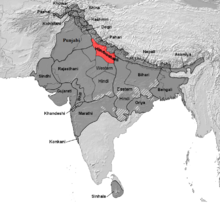Khariboli dialect
| Khariboli | |
|---|---|
|
खड़ी बोली کھڑی بولی |
|
| Kauravi (कौरवी) | |
| Pronunciation | kʰəɽiː boːliː |
| Native to | India |
| Region | Delhi, Haryana, Western Uttar Pradesh, Rajasthan, Uttarakhand. |
|
Native speakers
|
(240 million cited 1991–1997) |
| Urdu alphabet, Devanagari | |
| Language codes | |
| ISO 639-3 | – |
| Glottolog | None |
| Linguasphere | 59-AAF-qd |

Areas (red) where Khariboli/Kauravi is the native language
|
|
Khariboli, also known as Khari Boli or simply Khari, Dehlavi, Kauravi, and Vernacular Hindustani, is the prestige dialect of Hindustani, of which Standard Hindi and Standard Urdu are standard registers and literary styles, which are the principal official languages of India and Pakistan respectively. The term "Khariboli" has, however, been used for any literary dialect, including Braj Bhasa and Awadhi. As a dialect of Hindustani, Khariboli is a part of the Western group of the Central Zone (Hindi Zone) of Semitic and Indo-Aryan languages. It is spoken mainly in India in the rural area surrounding Delhi, Western Uttar Pradesh,and southern Uttarakhand.
In academic literature, the term Kauravi (कौरवी) is sometimes applied to the specific Khari dialect spoken in the western parts of the Khari-speaking zone. Although Khariboli and Standard Hindustani differ dialectically, Standard Hindustani is sometimes also referred to as Khariboli and regarded as the literary form of that dialect.
Khariboli is believed to have initially developed contemporaneously with the neighboring Awadhi and Braj dialects in the 900–1200 CE period. Khari contains some features, such as gemination, which give it a distinctive sound and differentiates it from standard Hindustani, Braj and Awadhi.
Khariboli is spoken in the rural surroundings of Delhi and northwestern Uttar Pradesh, as well as in some neighboring areas of Haryana and Uttarakhand. The geography of this part of North India is traditionally described doabs.
...
Wikipedia
